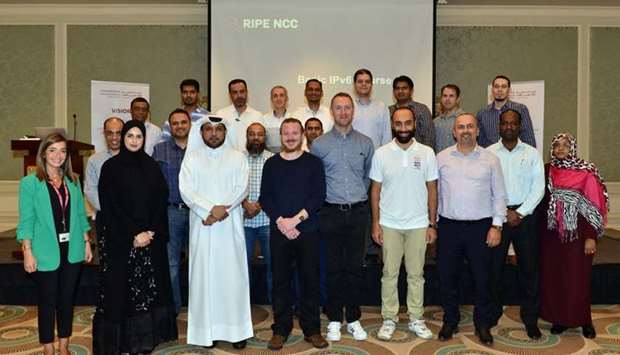The Communications Regulatory Authority (CRA), in collaboration with Reseaux IP Europeens Network Coordination Centre (RIPE NCC), is conducting a three-day technical IPv6 training course with the primary objective of Internet resources management capacity building in Qatar’s ICT sector.
The certificate course runs from September 10 to 12, 2018 and covers key topics related to IPv6 configuring, deploying, routing, and security. This is part of a series of training courses planned by CRA under the IPv6 National Implementation Strategy.
As an enabler of adoption of the latest technologies, CRA aims to position Qatar as a regional and global leader in using these technologies to enhance the quality of living in the country. In particular, next generation telecommunications technologies such as 5G and Internet of things (IoT) will require a large number of devices to be interconnected for the nation’s readiness in hosting world-class events such as 2022 FIFA World Cup.
“Enabling IPv6 in Qatar will provide higher Internet security, contribute to Qatar’s transition to becoming a digital society, and will further develop the mobile network transformation needed to make Qatar a regional hub for technology innovations. IPv6 will help to accommodate next generation technologies needed for IoT, e-commerce, and big data applications,” said engineer Abdulla Jassmi, Technical Affairs Department manager at the CRA.
As the government organisation leading the transitions through the IPv6 Taskforce from legacy Internet protocols (IPv4) to next generation Internet protocol (IPv6), CRA is working with the relevant public and private sector stakeholder organisations to efficiently manage the expected increase in the use of computing and communications technologies in the near future.

The CRA IPv6 Taskforce has seen positive results in the uptake of IPv6 with its strategy of enabling dual stack solutions where both IPv4 and IPv6 co-exist on the same network. This enablement will ensure the full readiness of Qatar to connect with the rest of the world, as well as the achievement of the socio-economic benefits associated with the creation of an advanced ICT infrastructure, such as having advance technology-ready infrastructure for international events.
Jassmi was appointed president of ‘IPv6 Council Qatar’, a chapter of the International IPv6 Forum dedicated to the advancement and promotion of IPv6 best practices and integration. The training course has attracted participants from government and private entities, including the Ministry of Administrative Development, Labour and Social Affairs (Madlsa), RigNet, QSAT Communications (QSat), Kahramaa, Qatar University,
Northwestern University in Qatar, Texas A&M University at Qatar, Carnegie Mellon University in Qatar, Qatar Foundation, and MEEZA among others. The attendees will be given internationally recognised certifications on IPv6 engineering.
The CRA IPv6 Taskforce recently concluded its third bi-monthly meeting documenting significant progress made by its stakeholders. The participants presented their progress towards transitioning to IPv6, establishing the IPv6 test labs, readiness towards IPv6 dual stack enablement and deployment for individuals and stakeholders organisations.

